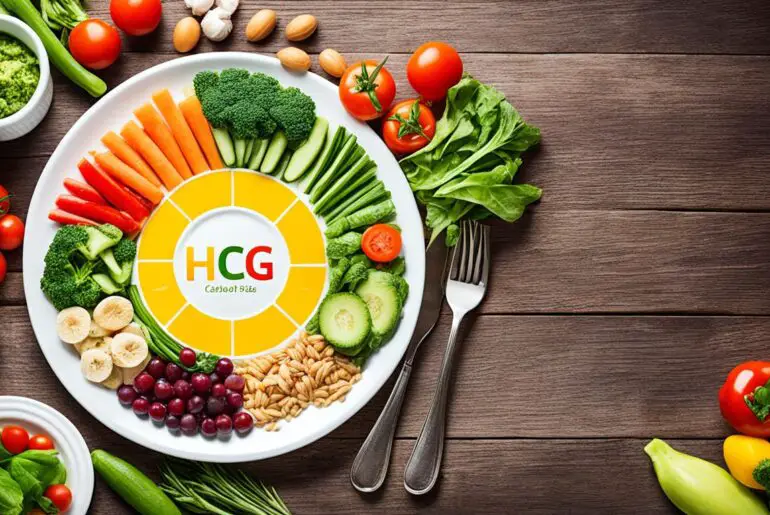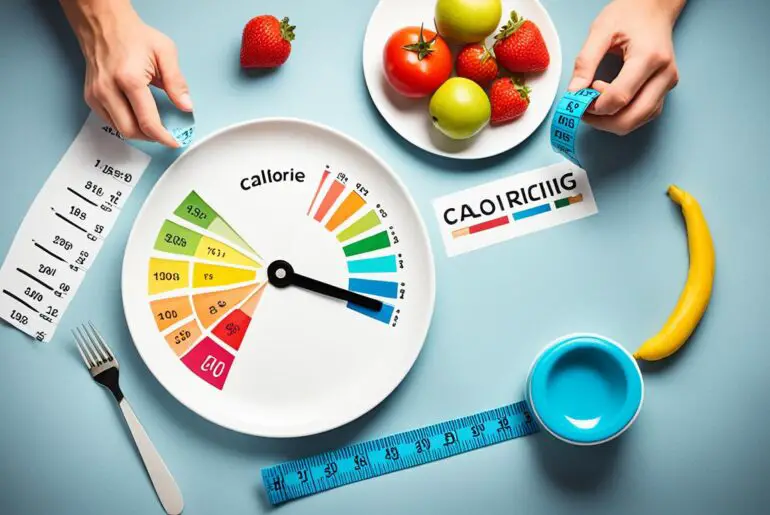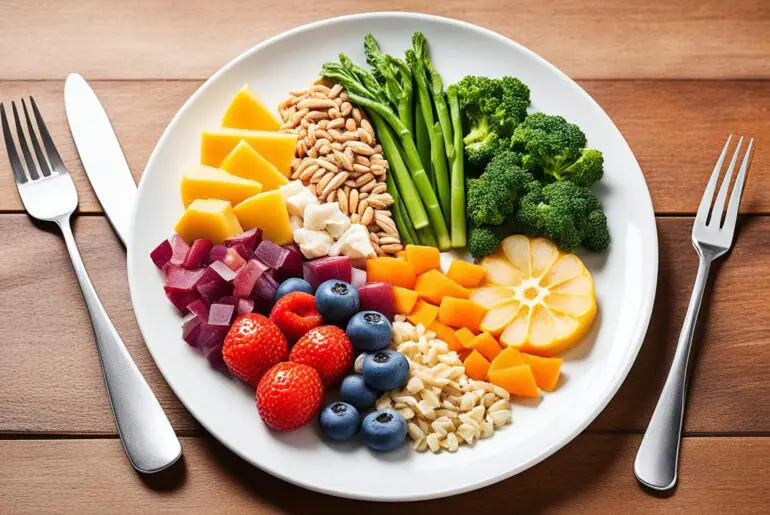Are you intrigued by the idea of achieving weight loss through extreme calorie restriction? The controversial HCG diet promises rapid results, but at what cost? In this article, we delve into the world of HCG diet calories and explore whether they can truly sustain energy levels while on this controversial weight loss plan.
Key Takeaways:
- The HCG diet combines low-calorie intake with HCG supplements or hormone injections.
- Rapid weight loss on the HCG diet is primarily attributed to extreme calorie restriction rather than the effects of the HCG hormone itself.
- The FDA has not approved HCG for weight loss, and health experts caution against its use due to potential safety concerns.
- The HCG diet may lead to nutrient deficiencies and is considered unsafe, unhealthy, and ineffective for sustainable weight loss.
- There are safer and more evidence-based approaches to weight loss that prioritize overall health and long-term success.
Understanding the HCG Diet
The HCG diet is a popular weight loss plan that involves three main phases: loading, weight loss, and maintenance. It incorporates the use of HCG supplements or hormone injections to support the weight loss process.
HCG Diet Phases:
- Loading Phase: During this phase, individuals consume high-calorie, high-fat foods for a short period while also taking HCG supplements or receiving hormone injections. This loading phase is believed to prepare the body for the subsequent weight loss phase.
- Weight Loss Phase: In this phase, calorie intake is significantly restricted to 500 or 800 calories per day, depending on the specific HCG diet plan. The low-calorie intake, combined with the continued use of HCG, is thought to help suppress appetite and promote fat loss.
- Maintenance Phase: After a designated period of time in the weight loss phase, the maintenance phase begins. Calorie intake is gradually increased while HCG supplementation or injections are discontinued. The goal of this phase is to stabilize weight and establish healthy eating habits.
The HCG diet emphasizes specific food choices during each phase to support weight loss and overall health. Lean proteins, certain vegetables, limited fruits, and specific seasonings are typically included in the diet plan.
Controversy Surrounding the HCG Diet
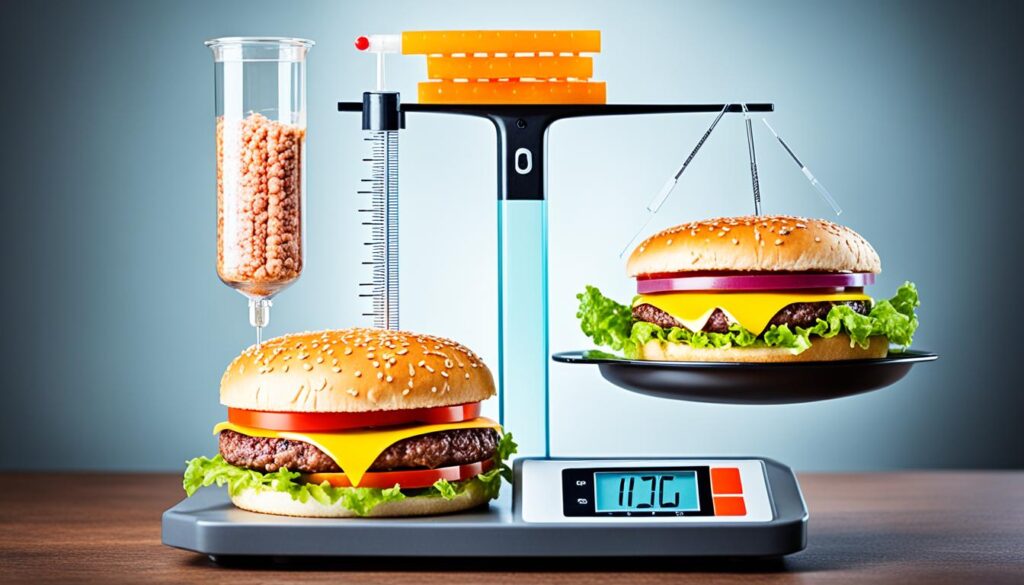
The HCG diet has ignited significant controversy, drawing attention to its lack of scientific evidence and potential health risks. The controversy primarily revolves around the use of HCG supplements or injections for weight loss purposes. It is important to note that the U.S. Food and Drug Administration (FDA) has only approved HCG prescriptions for the treatment of female infertility and has not endorsed HCG supplements for weight loss.
A key concern surrounding the HCG diet is the sale of illegal HCG supplements in the United States for weight loss despite their lack of FDA approval. These unregulated supplements can pose serious health risks to individuals who consume them, as their safety and efficacy have not been proven through rigorous scientific research or clinical trials.
The FDA Warning
The FDA has explicitly cautioned against the use of HCG supplements for weight loss due to their potential adverse effects and the absence of proven benefits. These warnings highlight both the legal restrictions on selling HCG for weight loss and the potential consequences of consuming these unregulated products.
It is important to prioritize your health and well-being when considering weight loss methods. The HCG diet, with its controversial use of HCG supplements, may not be a safe or effective option.
Health experts widely consider the HCG diet to be unsafe, unhealthy, and ineffective for sustainable weight loss. The diet’s extreme calorie restriction, coupled with its reliance on unapproved HCG supplements, raises significant concerns about nutritional deficiencies, potential side effects, and the risk of developing disordered eating behaviors.
Exploring Safer Weight Loss Options
Rather than resorting to the HCG diet, it is advisable to seek out evidence-based and safer weight loss methods. Focusing on balanced nutrition, regular physical activity, and sustainable lifestyle changes can promote healthier habits and long-term weight management.
- Consult a healthcare provider or registered dietitian: Enlisting the guidance of professionals can help develop a personalized weight loss plan tailored to individual needs and goals.
- Adopt a balanced and nutritious eating plan: Prioritize whole foods, lean proteins, fruits, vegetables, and whole grains to ensure adequate nutrient intake.
- Incorporate regular physical activity: Engage in enjoyable activities such as walking, jogging, swimming, or cycling to support both physical and mental well-being.
- Practice portion control: Pay attention to portion sizes and listen to your body’s hunger and satiety cues to maintain a healthy balance of food intake.
- Make sustainable lifestyle changes: Focus on long-term habits rather than quick fixes. Small, consistent changes over time can lead to significant improvements in overall health and well-being.
By prioritizing sustainable weight loss methods and seeking guidance from professionals, individuals can achieve their health and weight loss goals with reduced risks and improved long-term outcomes.
Nutritional Considerations on the HCG Diet
The HCG diet is characterized by severe calorie restriction, which can result in significant nutritional considerations and complications. Due to the low-calorie intake, individuals following the HCG diet may experience nutrient deficiencies, leading to potential health risks and impairments in overall well-being.
One of the major concerns with the HCG diet is the limited food choices it allows. Dairy, grains, and certain vegetables are excluded from the diet, depriving individuals of essential nutrients like B vitamins and fiber. These nutrients play crucial roles in energy production, immune function, and proper digestion.
The low-calorie nature of the diet can also lead to various issues. The body requires a sufficient number of calories to maintain normal bodily functions and sustain energy levels throughout the day. With such a restricted caloric intake, fatigue and irritability may commonly arise. In addition, the lack of dietary fiber from the limited food choices can contribute to constipation and other digestive discomforts.
“The HCG diet does not provide a well-rounded, balanced diet and can pose significant risks to overall nutrition and health.” – Dr. Sarah Thompson, Registered Dietitian
To illustrate the potential nutrient deficiencies on the HCG diet, here is a table outlining the key nutrients and their food sources that may be restricted:
| Nutrient | Food Sources |
|---|---|
| B Vitamins (B12, B6, thiamin, riboflavin) | Meat, poultry, fish, dairy, fortified cereals |
| Fiber | Whole grains, fruits, vegetables, legumes |
| Calcium | Dairy products, leafy greens, fortified plant-based milks |
| Vitamin D | Fatty fish, egg yolks, fortified dairy products |
It is essential to recognize that the HCG diet does not provide a well-rounded, balanced nutritional profile. Such deficiencies can have long-term consequences on overall health and wellness. Therefore, health experts strongly advise against following the HCG diet for sustained periods.
“The HCG diet does not meet the necessary nutritional requirements, and it can lead to multiple deficiencies that can impact various aspects of health.” – Dr. Amanda Ramirez, Nutrition Specialist
Recognizing the importance of proper nutrition, it is recommended to explore safer and more sustainable weight loss options that prioritize a balanced diet containing all essential nutrients. Consulting with a registered dietitian or healthcare provider is crucial in developing a personalized weight loss plan that promotes overall health and well-being.
Safety Concerns with the HCG Diet
https://www.youtube.com/watch?v=Q8pNgOzeFoA
The safety of the HCG diet is of utmost importance to health professionals. The severe calorie restriction and reliance on HCG supplements or injections can have adverse effects on overall health. It is vital to be aware of the potential risks and side effects associated with this weight loss plan.
Side effects commonly reported by individuals following the HCG diet include headaches, fatigue, and depression. The extreme calorie restriction may lead to nutrient deficiencies, affecting the body’s ability to function optimally. It is essential to ensure a well-rounded, balanced diet to prevent these deficiencies and maintain overall health.
Furthermore, serious adverse reactions have been reported in some cases, including blood clots and cardiac issues. The use of HCG for weight loss is not approved by the FDA, and its safety is a subject of concern among health professionals.
“The HCG diet may cause various adverse effects, including fatigue, headaches, and potential nutrient deficiencies.”
Given these safety concerns, health experts strongly advise against using the HCG diet for weight loss. It is crucial to prioritize safety and explore alternative, evidence-based methods for achieving health and weight loss goals.
| Potential Health Risks | Safety Concerns |
|---|---|
| Headaches | Extreme calorie restriction |
| Fatigue | Potential nutrient deficiencies |
| Depression | Adverse reactions (e.g., blood clots, cardiac issues) |
Lack of Scientific Evidence for the HCG Diet
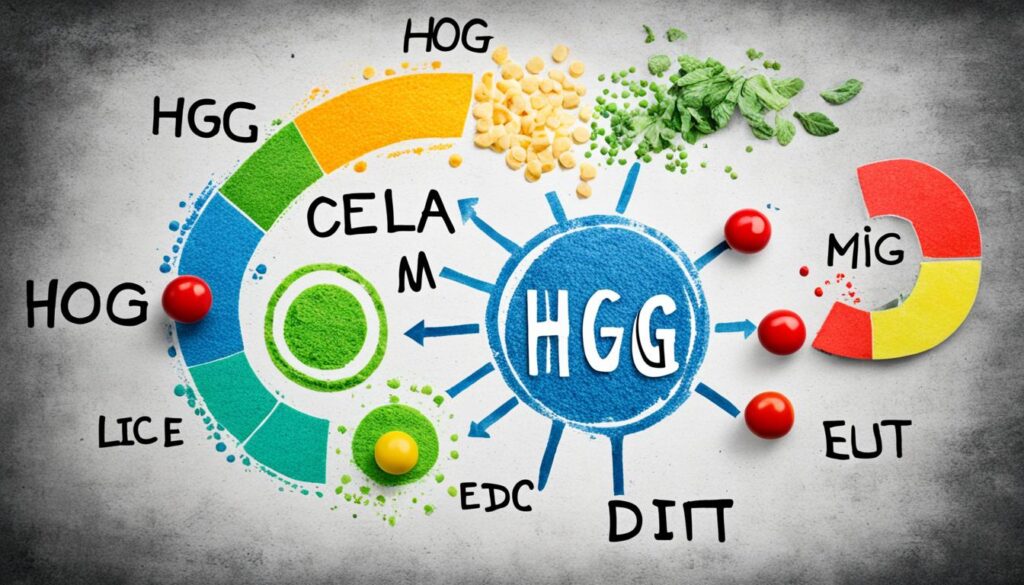
Numerous scientific studies have been conducted on the HCG diet, shedding light on its effectiveness and safety. These studies have produced valuable insights into the weight loss achieved on the diet and the role played by HCG in the process. The overall consensus among researchers and health professionals is that the weight loss achieved on the HCG diet is primarily attributed to extreme calorie restriction rather than the effects of HCG itself.
The scientific studies have gone a step further and compared the effects of HCG injections to placebo injections on weight loss outcomes. Surprisingly, these studies have shown no significant difference in weight loss between the two groups. This finding has raised concerns about the effectiveness of the HCG hormone in promoting weight loss. It suggests that the weight loss observed in individuals following the HCG diet may be primarily influenced by the placebo effect, psychological factors, or the result of the extreme calorie restriction.
The lack of scientific evidence supporting the HCG diet has significant implications for its efficacy and safety. Without solid scientific backing, it becomes challenging to ascertain its true effectiveness in promoting sustainable weight loss. Health professionals emphasize the importance of evidence-based approaches to weight loss, where interventions are supported by scientifically rigorous studies. Relying on unproven methods like the HCG diet can be risky and may lead to false hopes and disappointment.
“The lack of scientific evidence supporting the effectiveness of the HCG diet raises concerns about its viability as a weight loss strategy. It is important to prioritize evidence-based approaches that have been thoroughly evaluated and proven to be safe and effective.”
Health professionals strongly caution against relying solely on the HCG diet for weight loss purposes. Instead, they advocate for balanced and sustainable methods that have been scientifically proven to produce long-term results. These approaches include a combination of healthy eating, regular physical activity, behavior changes, and seeking guidance from healthcare providers or registered dietitians.
By adopting evidence-based weight loss strategies, individuals can achieve their goals in a safe and sustainable manner while prioritizing their overall health and well-being.
Alternative Weight Loss Options
When it comes to achieving healthy weight loss, there are numerous evidence-based methods and sustainable approaches that are considered safer and more effective than the controversial HCG diet. Instead of subjecting yourself to extreme calorie restriction and potentially harmful hormone supplements, consider the following alternatives:
Balanced and Nutritious Eating Plans
One of the key pillars of successful weight loss is adopting a balanced and nutritious eating plan. This involves consuming a variety of foods from different food groups to ensure you’re getting all the essential nutrients your body needs. By focusing on whole foods, such as fruits, vegetables, lean proteins, whole grains, and healthy fats, you can nourish your body while also promoting weight loss.
Regular Physical Activity
Incorporating regular physical activity into your daily routine is another crucial aspect of achieving sustainable weight loss. Engaging in activities you enjoy, such as brisk walking, jogging, cycling, or swimming, can help increase calorie expenditure, improve cardiovascular health, and boost your overall well-being. Aim for at least 150 minutes of moderate-intensity exercise or 75 minutes of vigorous-intensity exercise per week.
Portion Control
Controlling portion sizes is an effective strategy for managing calorie intake and promoting weight loss. By being mindful of your portion sizes and practicing portion control techniques, such as using smaller plates, measuring food portions, and paying attention to hunger and fullness cues, you can create a calorie deficit without feeling deprived or hungry.
Behavior Changes
Changing behaviors and habits that contribute to excess weight is essential for long-term weight loss success. This may involve addressing emotional eating, practicing mindful eating, developing healthier coping mechanisms, and adopting positive lifestyle changes. Seeking support from a therapist, counselor, or support group can be beneficial in addressing underlying emotional factors and establishing healthier habits.
Working with a healthcare provider or registered dietitian can help you develop an individualized weight loss plan that aligns with your specific needs and goals. These professionals can provide personalized guidance, monitor your progress, and offer support throughout your weight loss journey.
Remember, achieving and maintaining a healthy weight is not an overnight process. It requires patience, consistency, and dedication. Prioritize your overall health and well-being by choosing evidence-based methods and sustainable approaches that will not only help you lose weight but also improve your overall quality of life.
Take a look at the table below for a quick comparison of the HCG diet versus alternative weight loss options:
| HCG Diet | Alternative Weight Loss Options | |
|---|---|---|
| Effectiveness | Limited evidence | Supported by scientific research |
| Sustainability | Difficult to maintain long-term | Encourages sustainable lifestyle changes |
| Health risks | Potential nutrient deficiencies, side effects, lack of FDA approval | Focuses on overall health and well-being |
| Professional guidance | Not required | Supported by healthcare providers and registered dietitians |
Potential Risks and Disadvantages of the HCG Diet

The HCG diet is associated with several risks and disadvantages that make it an unsafe and ineffective weight loss method. It is crucial to consider these factors before embarking on any weight loss plan.
Nutrient Deficiencies
Due to the limited food choices on the HCG diet, nutrient deficiencies may occur. The exclusion of certain food groups like dairy, grains, and some vegetables can lead to inadequate intake of essential nutrients such as B vitamins and fiber. These deficiencies can result in fatigue, weakened immunity, and other health complications.
Potential Side Effects
The low-calorie nature of the HCG diet can cause various side effects, including fatigue and irritability. The extreme calorie restriction may also lead to muscle loss, metabolic slowdown, and even disordered eating behaviors. Additionally, the use of HCG supplements or injections can have adverse effects on overall health and well-being.
Risk of Health Complications
Using HCG supplements or injections for weight loss purposes is not approved by the FDA. The safety and long-term effects of HCG on the body are largely unknown, and there have been reports of serious adverse reactions, such as blood clots and cardiac issues. It is essential to prioritize your health and choose safer weight loss options.
Summary of Risks and Disadvantages:
| Risks and Disadvantages | Potential Consequences |
|---|---|
| Nutrient deficiencies | Fatigue, weakened immunity, health complications |
| Potential side effects | Fatigue, irritability, muscle loss, metabolic slowdown, disordered eating behaviors |
| Risk of health complications | Blood clots, cardiac issues, unknown long-term effects |
Considering these risks and disadvantages, it is advisable to explore alternative weight loss options that prioritize balanced nutrition, regular physical activity, and sustainable lifestyle changes. It is crucial to consult with a healthcare professional or registered dietitian before starting any weight loss journey.
Conclusion
The HCG diet, a controversial weight loss plan that combines severe calorie restriction with the use of HCG supplements or injections, raises concerns among health experts. Despite claims of rapid weight loss, there is no scientific evidence supporting the effectiveness of the HCG diet. Additionally, potential safety concerns such as nutrient deficiencies and side effects, coupled with the lack of FDA approval for HCG supplements, make it a risky choice for those seeking sustainable weight loss.
To promote health and achieve long-term weight loss goals, it is advisable to explore safer and more evidence-based approaches. Focusing on balanced nutrition, regular physical activity, and sustainable lifestyle changes are key factors in achieving lasting weight management. Working with a healthcare provider or registered dietitian can help create an individualized plan that aligns with one’s specific needs and goals.
By prioritizing overall health and considering alternative weight loss options, individuals can make informed decisions that support their well-being. It is important to choose methods that are backed by scientific research and have a track record of success. Embracing healthy habits and making gradual, sustainable changes to one’s diet and lifestyle can lead to lasting weight loss without the risks associated with extreme dieting approaches like the HCG diet.
FAQ
Can the HCG diet provide sustained energy?
The HCG diet is not designed for sustaining energy. It involves severe calorie restriction, which can lead to fatigue and other side effects. It is not a recommended method for boosting energy levels.
What are the three phases of the HCG diet?
The HCG diet consists of three phases: loading, weight loss, and maintenance. During loading, individuals consume high-calorie foods. The weight loss phase involves severe calorie restriction, and the maintenance phase gradually increases calorie intake.
Is the HCG diet considered safe?
The HCG diet is a controversial weight loss plan that carries potential risks. These include nutrient deficiencies, side effects such as fatigue and irritability, and the risk of developing disordered eating behaviors. It is not recommended by health experts.
What are the potential side effects of the HCG diet?
Common side effects of the HCG diet include headaches, fatigue, depression, and potential nutrient deficiencies. Serious adverse reactions, such as blood clots and cardiac issues, have also been reported. It is important to consider the potential risks before starting this diet.
Does the HCG diet have scientific evidence supporting its effectiveness?
Scientific studies have shown that weight loss achieved on the HCG diet is primarily due to extreme calorie restriction rather than the effects of HCG. Studies comparing HCG injections to placebo injections have shown no significant difference in weight loss between the two groups.
What are some alternative weight loss options to consider?
Instead of the HCG diet, there are several alternative weight loss options that are considered safer and more effective. These include balanced and nutritious eating plans, regular physical activity, portion control, and behavior changes. Working with a healthcare provider or registered dietitian can help develop an individualized weight loss plan.
What are the potential risks and disadvantages of the HCG diet?
The HCG diet carries several risks and disadvantages, including the potential for nutrient deficiencies, side effects such as fatigue and irritability, the risk of developing disordered eating behaviors, and the lack of FDA approval for HCG supplements. It is important to carefully consider these factors before deciding to try the HCG diet.
What is the conclusion about the HCG diet?
The HCG diet is a controversial weight loss plan that lacks scientific evidence and carries potential risks. It is not recommended by health professionals due to the severe calorie restriction, potential side effects, and lack of FDA approval for HCG supplements. Safer and more effective weight loss options should be explored.


